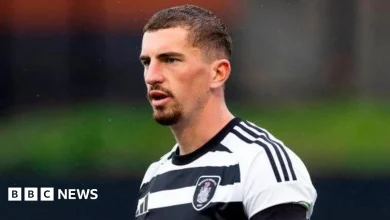Radio show presenter suffers major heart attack and undergoes emergency surgery as he posts snap from hospital bed

A BREAKFAST radio show presenter has suffered a major heart attack.
The Heart 80s DJ even underwent emergency surgery before he shared a rather worrying snap from his hospital bed.
Sign up for the newsletter
Thank you!
Simon Beale, who hosts Heart 80s Breakfast, has been admitted to hospitalCredit: Instagram
He shared the news on Instagram and revealed he had a major heart attack three weeks agoCredit: Instagram
Simon Beale, who hosts Heart 80s, wakes the UK up with the best throwback tracks most mornings – but this week he shared a grim health battle he had fought in secret.
The radio DJ revealed how three weeks ago, he was walking his dog when he suffered a major heart attack.
“Even when it was happening, I was trying to convince myself ‘it can’t be a heart attack’,” he penned in the caption revealing the scary incident on social media.
He went on to add: “I’m 53, never smoked, do 15,000 steps a day and eat averagely healthily.
Read More about Radio Stars
MIC DROP
Radio star QUITS station after six years – and final show has already aired
STAR’S SUPPORT
ITV ‘standing by’ Loose Women’s Kaye Adams after she’s suspended from BBC
“And yet, I couldn’t deny the paralysing pain across my chest, so I phoned 999.
“Within a couple of hours, I’d had two stents fitted in the main artery at the front of my heart, which was completely blocked.
“I’d gone from a normal Monday (work, shopping, walking the dog) to being blue-lighted in an ambulance, having life-saving surgery and starting the long road to recovery, wired up to numerous monitors.”
Simon continued: “It’s obviously been a massive shock but it’s also made me even more grateful, not just for life itself, but also for the incredible people around me.
“The NHS were (and are) phenomenal.
“The care I received was exceptional and I am beyond thankful to every doctor, nurse, consultant, specialist and hospital worker who looked after me for 8 nights.
“They saved my life. They are true heroes.”
Thanking his family and friends, and employer, Simon went on: “My family, who dropped everything to be there for me; friends who phoned, messaged and have done whatever they can to help practically; and my work family at Heart & Global (as well as the award teams I was due to work with) who have been overwhelmingly kind, caring, considerate and thoughtful. Thank you so much.”
He added: “I’m now recovering at home, getting used to a cocktail of medication and a whole new diet, taking each day as it comes.
“I’ve still got a way to go, but I AM on the mend and slowly making progress, hoping to be back at work soon.
How to reduce your risk of heart attacks and stroke
You can reduce your risk of heart attack and stroke with many of the same methods.
Heart attacks and strokes, although affecting different organs of the body, are both what we call cardiovascular events.
Both arise from similar underlying conditions, such as atherosclerosis —a buildup of fatty deposits in the arteries.
According to the American Heart Association, the risk factors for heart attacks and strokes are largely the same: high blood pressure, high cholesterol, smoking, obesity, physical inactivity and diabetes.
Therefore, addressing these risk factors can simultaneously reduce the risk of both conditions.
Here are ways you can prevent the two:
Healthy diet
- More fruit and veg: The DASH, which emphasises fruit, vegetables, whole grains and lean proteins, has been shown to reduce blood pressure and improve heart health.
- Less fats: Too much saturated and trans fats can raise cholesterol levels and increase the risk of atherosclerosis. Go for healthier fats like those found in olive oil, nuts, and avocados.
- Limit salt: High salt intake is linked to high blood pressure, a major risk factor for both heart attack and stroke. The NHS recommends no more than 6g of salt per day for adults.
- Fibre: Foods high in soluble fibre, such as oats and beans, can help lower cholesterol levels.
Exercise
Walking, running, cycling, swimming – whatever you like, do it!
Aerobic exercise can strengthen the heart and improve circulation.
The NHS advises at least 150 minutes of moderate-intensity aerobic activity or 75 minutes of vigorous-intensity activity each week.
Strength training exercises can help control weight, improve cholesterol levels, and reduce blood pressure. It is recommended twice a week by the NHS.
Manage blood pressure
Healthy diet and exercise can help keep your blood pressure in check.
But it is worth monitoring it yourself after the age of 40, at least, when the NHS invites adults for a check-up every five years.
High blood pressure often has no symptoms but significantly increases the risk of heart attack and stroke.
Quit smoking
One of the best ways to quit smoking is to use resources provided by NHS Smokefree. Support groups, medications, and other tools to help quit smoking such as vapes could be what you need to kick the habit for good – and it’s free.
Limit booze
Excessive alcohol consumption can increase blood pressure and contribute to weight gain, which can snowball and become a heart health risk.
The NHS recommends not regularly drinking more than 14 units of alcohol per week.
“BTW, the irony of the radio station I work for is not lost on me.”
Reacting to Simon’s hospital dash and heart attack, one person penned: “Oh Simon! Take care & glad you are on the mend.”
A second added: “Gosh really hope you heal really well xx.”
mae day
Molly-Mae’s new show seriously concerns me… making Bambi centre stage will backfire
SCHOOL’S OUT
London’s best free indoor attractions for families – perfect for rainy days
While a third wrote: “Oh Simon!!! Sending loads of love. You poor thing. So scary. Glad you’re doing alright xx.”
And a fourth said: “Omg Simon, sending you best wishes for a speedy recovery.”
He is now at home recoveringCredit: Instagram
He was walking his dog when he had a heart attack three weeks agoCredit: Instagram
Simon is known for his work on Heart radioCredit: Instagram




